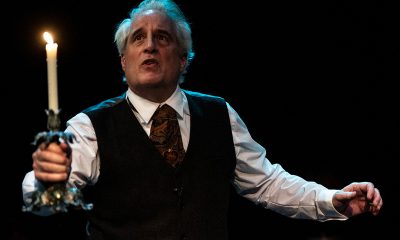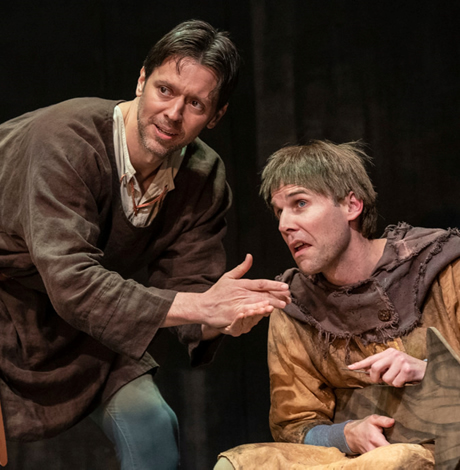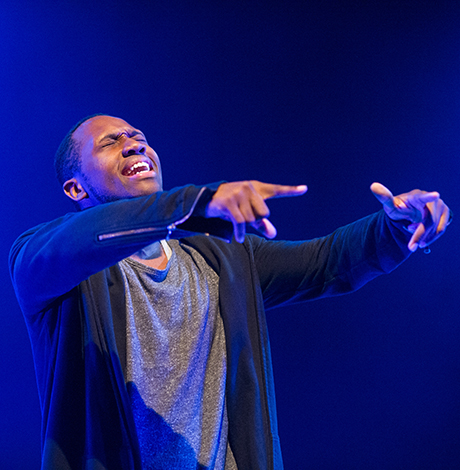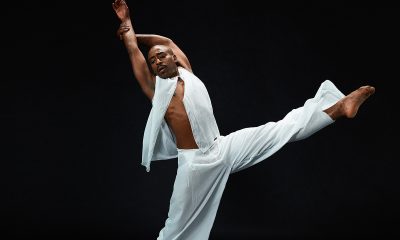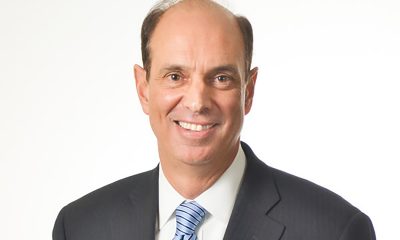Arts & Entertainment
Maps and memories
‘Planet’ production explores fear and isolation among gay men
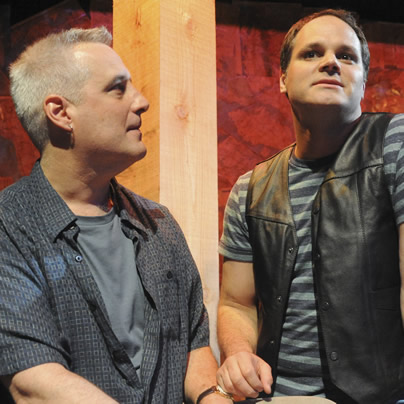
‘Lonely Planet’
Through June 17
MetroStage
1201 N. Royal St., Alexandria
$45-$50 (military and student discounts available)
703-548-9044
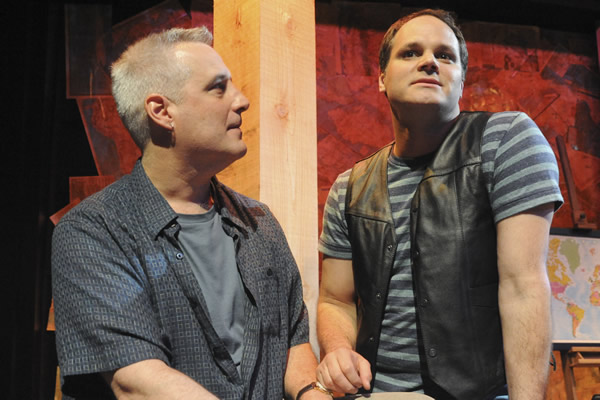
Michael Russotto, left, and Eric Sutton in ‘Lonely Planet’ by playwright Steven Dietz. (Photo by Christopher Banks; courtesy MetroStage)
Tucked away inside his tidy map shop, Jody does his best to keep the uncertainties of the turbulent outside world at bay. But his is an unwinnable strategy. Sooner or later, he must confront what terrifies him most.
In Steven Dietz’s 1994 play “Lonely Planet” — currently playing at MetroStage in Alexandria — the playwright describes a plague that’s affecting men in an American city, and though he doesn’t refer to the disease by name, it’s never for a moment in doubt that the culprit is AIDS. Inspired by maps and Ionesco’s absurdist play “The Chairs,” Dietz explores death and friendship during the most harrowing time of the crisis.
The action is restricted to one space: a small, carefully appointed shop. Here, gay middle-aged Jody (Michael Russotto) has constructed an orderly sanctuary where he deals exclusively with the exactness of latitude and longitude, a place where sales are occasionally referred to, but customers are never seen. We do, however, see Carl (Eric Sutton), a gay younger friend who frequently visits bearing irony and chairs (ladder back, rocker, Windsor) which he persuades Jody to store for him because his apartment is too small. After spinning a tale or two and delivering a pep talk on getting out and about, Carl dashes off to one of his invented jobs (tabloid reporter, art conservator, auto glazier) only to return minutes later with more chairs and chatter.
Soon we learn that Carl’s ever-increasing hoard of chairs once belonged to his and Jody’s friends who have died in the frighteningly lethal epidemic. Carl keeps one chair belonging to each victim as a remembrance. It’s also revealed that Carl’s true employment involves clearing out the homes of these recently deceased friends. And those made-up jobs? They also belonged to the dearly departed.
After intermission, the stage is lit to reveal even more chairs (straw bottomed, barber, Breuer). The image gets a chuckle from the audience, but they’re a terrifying reminder to Jody of death, disease and the uncertainty of his HIV status (Jody has yet to be tested). His fear is palpable. It’s up to Carl to coax Jody to venture beyond the store.
Set designer Jane Fink has imagined a shop filled with globes and scrolled maps. Its heavy dark furniture and transom door feel entirely resistant to time. The stage is backed by a wall of collaged maps. At the top of a simple proscenium is the earth as photographed from outer space. By the show’s end, dozens of chairs are piled on the stage, creating a tall and odd monument. Sounds questionable, but it proves exceedingly poignant.
As Jody and Carl, Russotto and Sutton, respectively (both actors are gay), are believable as longtime, caring friends and each do their best to elevate sometimes plodding monologues. Russotto’s performance is deceptive — it’s quiet but packs an emotional wallop. And Sutton is delightful as the vexing, leather vest-wearing Carl whose sarcasm can belie his good heartedness.
Despite the sad subject matter, much of “Lonely Planet” is playful and fun. And while the allegorical and symbolic aspects of the show can get a little heavy handed, skilled director John Vreeke (also gay) guides the actors in creating some glowing, touching moments. And Vreeke (with the help of lighting designer Jessica Lee Winfield) stages the unexpected and very memorable ending just right.
At a recent performance, the audience was comprised mostly of midshipmen from the Naval Academy’s drama group, the Masqueraders. It struck others present that these young men and women were toddlers when the play was penned almost 20 years ago. Through “Lonely Planet,” they traveled to a time when testing positive was a death sentence, but they were also shown a glimpse of the gay community at its very best and the enduring value of friendship.
Television
Netflix’s ‘The Boyfriend’ is more than a dating show
Cast talks about series’ importance to LGBTQ audiences around the world

It’s unfortunate how poorly so many people view reality television.
Of course, the genre doesn’t always do itself any favors; for decades, the most prominent examples of this medium were drunken fights and jaw-dropping bigotry. But viewers forget that reality TV has evolved along with its eternally growing audience. It still contains wild drama, yes, but recent years have seen an increase in shows like “RuPaul’s Drag Race” and “We’re Here,” which offer nuanced insight into the experiences of queer communities today. Series like these have an undeniable impact on the many who watch them, with their episodes among the most reliable sources of authentic representation that queer viewers can count on. That’s why reality television as a whole deserves more respect, and that’s why Netflix’s “The Boyfriend” is one of the most impactful programs airing today. The show has become a hit, with season 2 now streaming.
Japan’s first gay dating show, this series brings together a group of eligible men for one summer in ‘The Green Room,’ a house where they’ll live, run a small business, and hopefully find their true love. Overseen by a panel of commentators — a common practice for Japanese reality TV — the series has astounded for two seasons with the genuine emotions on display. Yet along with the romance, what sets “The Boyfriend” apart is just how informative it is. Not only by offering insight into a queer culture outside of America, but by creating a level of representation that Japan as a country has never seen before. So many scenes and stories on the show are important for LGBTQ audiences across the globe, but what truly sets “The Boyfriend” apart is the simple message that grounds this entire series: it’s not wrong to be gay.
“In Japan, LGBTQ+ people … [they] are prohibited,” said Durian, a commentator from “The Boyfriend” and one of Japan’s biggest drag performers. “They are regarded as nonexistent …[and] for some of the young people, when it comes to the fact that they are being ignored in society, it could lead to them not having pride in themselves.”
It was a sentiment echoed by “The Boyfriend” cast, with the group describing how LGBTQ identity is rarely discussed in public and only shown through stereotypes. “When I was in middle school, the word gay didn’t exist,” described Huwei, a contestant and member of Thailand’s national judo team. “People would use other words, [ones that] usually mean just being [like] women.” This is reflected in the portrayal of gay people in Japanese media, with the cast detailing how the few times they saw gay characters, it was always hyper-effeminate, ultra cheerful men — traits that were used as joke fodder for the audience. “They’re trying to be [funny], and they’re trying to make people laugh, but it didn’t necessarily have a positive impression,” said Tomoaki, whose time on the show saw the man grapple with accepting his own sexuality.
These topics come up naturally on the program, as well as other facets of what it means to live as a queer person in Japan, granting American audiences vital insight into an LGBTQ culture outside of their own. Durian explained their customs further, saying, “Japan is a bit reserved and very quiet. People may be a little frustrated because they think [the cast] should be more direct, but [their behavior] is really a part of Japanese culture. And if viewers can [understand] that, they’ll be happy.”
It can be easy to forget that the fight for LGBTQ liberation looks different in areas across the world. The cast of “The Boyfriend” not only portrays what dating looks like in their country, but also the many ways their communities fight for acceptance that international audiences don’t often get to see. It doesn’t do this in a way that discredits or villainizes Japanese culture — in fact, many of the men profess how much they love the country that raised them. But their national pride is paired with a hope that their country can grow and begin granting LGBTQ people the respect they deserve. It’s this desire that drives so much of the series’ emotion, making it all the more heartwarming when viewers realize just how important “The Boyfriend” is to this ongoing hope today.
“For me, I’d never been a part of a gay community … this is really [the first] time I was able to be really true to myself,” said Ryuki, a college student and the youngest member of the group. Bomi, who spent a majority of the season pining after fellow contestant Huwei, agreed, saying, “When I came to the ‘Green Room,’ honestly, in the beginning, I was scared … for the last 20 years, I have not really been honest to myself. But through the life I had [on this show], I’ve been able to be truly myself.”
The franchise’s inherent inclusivity not only allowed the men to find romance but to simply find community amongst one another. This led not only to great television but also to the entire cast raving about their time on the show, while also recognizing how hard it is to find this sense of belonging for so many LGBTQ people in Japan today.
As the conversation wound down, the men reflected on what their inclusion on this series means for their country going forward. As members of Japan’s inaugural gay dating show, they’ll be providing examples of queer identity outside of the grinning caricatures that have always permeated popular culture. They would finally be giving so many young LGBTQ viewers the knowledge that there are real people like them out there living happy lives today. This realization drove many of the cast to tears, with each expressing how they hoped these episodes would help those viewers desperately searching for representation. And while they all expressed their care, Bomi summarized the group’s thoughts on what they hoped people took away from “The Boyfriend” best.
“I want people to feel that they’re not alone. You’re not alone. I want to tell [them] that we all have the same kind of issues, and there are a lot of people who haven’t really expressed themselves yet … but we are here. We are here with you.”
An uplifting message of community, one that was only possible because of the genuine bonds this group forged throughout their experience. This shows just how much of an impact “The Boyfriend” is already making on Japanese culture, and it’s a reminder for viewers across the world that none of us are alone in the fight for queer equity today.
“The Boyfriend” season 2 is now streaming on Netflix.
Movies
50 years later, it’s still worth a return trip to ‘Grey Gardens’
Documentary remains entertaining despite its darkness
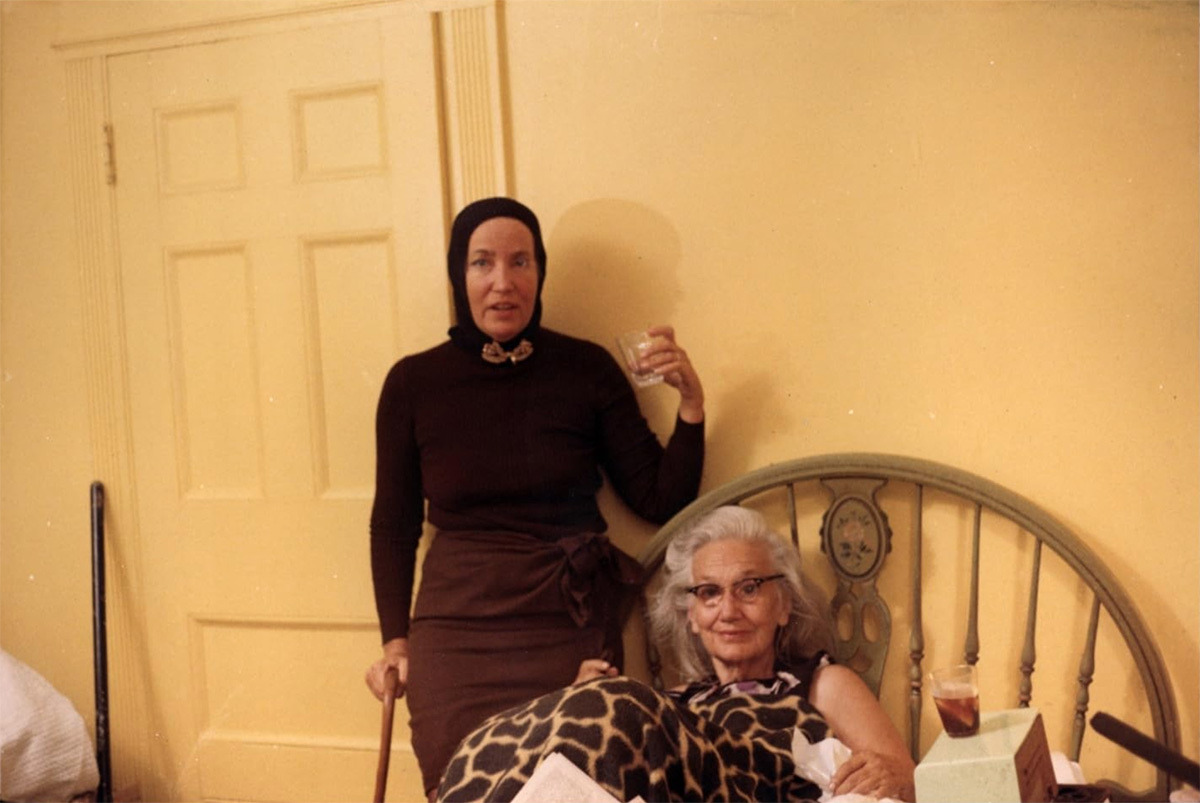
If we were forced to declare why “Grey Gardens” became a cult classic among gay men, it would be all the juicy quotes that have become part of the queer lexicon.
Celebrating the 50th anniversary of its theatrical release this month, the landmark documentary profiles two eccentrics: Edith Ewing Bouvier Beale and her daughter, Edith Bouvier Beale (known as “Big” and “Little” Edie, respectively), the aunt and cousin of former first lady Jaqueline Kennedy Onassis and socialite Lee Radziwell. Once moving within an elite circle of American aristocrats, they had fallen into poverty and were living in isolation at their run-down estate (the Grey Gardens of the title) in East Hampton, Long Island; they re-entered the public eye in 1972 after local authorities threatened eviction and demolition of their mansion over health code violations, prompting their famous relatives to swoop in and pay for the necessary repairs to avoid further family scandal.
At the time, Radziwell had enlisted filmmaking brothers David and Albert Maysles to take footage for a later-abandoned project of her own, bringing them along when she went to put in an appearance at the Grey Gardens clean-up efforts. It was their first encounter with the Beales; the second came two years later, when they returned with their cameras (but without Radziwell) and proceeded to make documentary history, turning the two Edies into unlikely cultural icons in the process.
On paper, it reads like something painful: two embittered former socialites, a mother and daughter living among a legion of cats and raccoons in the literal ruins of their former life, where they dwell on old memories, rehash old conflicts, and take out their resentments on each other, attempting to keep up appearances while surviving on a diet that may or may not include cat food. Truthfully, it is sometimes difficult to watch, which is why it’s easier to approach from surface level, focusing on the “wacky” eccentricities and seeing the Beales as objects for ridicule.
Yet to do so is to miss the true brilliance of a movie that is irresistible, unforgettable, and fascinating to the point of being hypnotic, and that’s because of the Beales themselves, who are far too richly human to be dismissed on the basis of conventional judgments.
First is Little Edie, in her endless array of headscarves (to cover her hair loss from alopecia) and her ever-changing wardrobe of DIY “revolutionary costumes,” a one-time model and might-have-been showgirl who is obviously thrilled at having an audience and rises giddily to the occasion like a pro. Flamboyant, candid, and smarter than we think, she’s also fearlessly vulnerable; she gives us access to an emotional landscape shaped by the heartbreaks of a past that’s gradually revealed as the movie goes on, and it’s her ability to pull herself together and come back fighting that wins us over. By the time she launches into her monologue about being a “S-T-A-U-N-C-H” woman, we have no doubt that it’s true.
Then there’s Big Edie, who comes across as an odd mix of imperious dowager and down-to-earth grandma. She gets her own chance to shine for the camera, especially in the scenes where she reminisces about her early days as a “successful” amateur vocalist, singing along to records of songs she used to perform as glimpses emerge of the beauty and talent she commanded in her prime. She’s more than capable of taking on her daughter in their endless squabbles, and savvy enough to score serious points in the conflict, like stirring up jealousy with her attentions to beefy young handyman Jerry – whom the younger Edie has dubbed “the Marble Faun” – when he comes around to share a feast of boiled corn-on-the-cob with them. “Jerry likes the way I do my corn,” she deadpans to the camera, even though we know it’s meant for Little Edie.
It’s not just that their eccentricities verge on camp; that’s certainly an undeniable part of the appeal, but it falls away quickly as you begin to recognize that even if these women are putting on a show for the camera, they’re still being completely themselves – and they are spectacular.
Yes, their verbal sparring is often shrill and palpably toxic – in particular, Big Edie has no qualms about belittling and shaming her daughter in an obviously calculated effort to undermine her self-esteem and discourage her from making good on her repeated threats to leave Grey Gardens. We know she is acting from fear of abandonment, but it’s cruel, all the same.
These are the moments that disturb us more than any of the dereliction we see in their physical existence; fed by nostalgia and forged in a deep codependence that neither wants to acknowledge, their dynamic reflects years of social isolation that has made them into living ghosts, going through the habitual motions of a long-lost life, ruminating on ancient resentments, and mulling endlessly over memories of the things that led them to their outcast state. As Little Edie says early on, “It’s very difficult to keep the line between the past and the present. Do you know what I mean?”
That pithy observation, spoken conspiratorially to the Maysles’ camera, sets the tone for the entirety of “Grey Gardens,” perhaps even suggesting an appropriate point of meditation through which to contemplate everything that follows. It’s a prime example of the quotability that has helped this odd little movie endure as a fixture in queer culture; for many LGBTQ people, both Edies – born headstrong, ambitious, and independent into a social strata that only wanted its women to be well-behaved – became touchstones of frustrated longing, of living out one’s own fabulousness in isolated secrecy. Add to that shared inner experience Little Edie’s knack for turning scraps into kitschy fashion (and the goofy-but-joyous flag dance she performs as a sort of climactic topper near the end), and it should be obvious why the Maysles Brothers’ little project still resonates with the community five decades later.
Indeed, watching it in today’s cultural climate, it strikes chords that resonate through an even wider spectrum, touching on feminist themes through these two “problematic” women who have been effectively banished for refusing to fit into a mold, and on the larger issue of social and economic inequality that keeps them trapped, ultimately turning them against each other in their powerlessness.
With that in mind, it’s clear these women were never filmed to be objects of ridicule. They’re survivors in a world in which even their unimaginably wealthy relatives would rather look away, offering a bare minimum of help only when their plight becomes a matter of public family embarrassment, and the resilience they show in the face of tremendous adversity makes them worthy of celebration, instead.
That’s why “Grey Gardens” still hits close to home, why it entertains despite its darkness, and why we remember it as something bittersweet but beautiful. By the end of it, we recognize that the two Edies could be any of us, which means they are ALL of us – and if they can face their challenges with that much “revolutionary” spirit, then maybe we can be “staunch” against our adversities, too.
a&e features
Marc Shaiman reflects on musical success stories
In new memoir, Broadway composer talks ‘Fidler,’ ‘Wiz,’ and stalking Bette Midler

If you haven’t heard the name Marc Shaiman, you’ve most likely heard his music or lyrics in one of your favorite Broadway shows or movies released in the past 50 years. From composing the Broadway scores for Hairspray and Catch Me if You Can to most recently working on Only Murders in the Building, Hocus Pocus 2, and Mary Poppins Returns, the openly queer artist has had a versatile career — one that keeps him just an Oscar away from EGOT status.
The one thing the award-winning composer, lyricist, and writer credits with launching his successful career? Showing up, time and time again. Eventually, he lucked out in finding himself at the right place at the right time, meeting industry figures like Rob Reiner, Billy Crystal, and Bette Midler, who were immediately impressed with his musical instincts on the piano.
“Put my picture under the dictionary definition for being in the right place at the right time,” Shaiman says. “What I often try to say to students is, ‘Show up. Say yes to everything.’ Because you never know who is in the back of the theater that you had no idea was going to be there. Or even when you audition and don’t get the part. My book is an endless example of dreams coming true, and a lot of these came true just because I showed up. I raised my hand. I had the chutzpah!”
Recalling one example from his memoir, titled Never Mind the Happy: Showbiz Stories from a Sore Winner ( just hit bookshelves on Jan. 27), Shaiman says he heard Midler was only hiring Los Angeles-based artists for her world tour. At the young age of 20, the New York-based Shaiman took a chance and bought the cheapest flight he could find from JFK. Once landing in L.A., he called up Midler and simply asked: “Where’s rehearsal?”
“Would I do that nowadays? I don’t know,” Shaiman admits. “But when you’re young and you’re fearless … I was just obsessed, I guess you could say. Maybe I was a stalker! Luckily, I was a stalker who had the goods to be able to co-create with her and live up to my wanting to be around.”
On the occasion of Never Mind the Happy’s official release, the Bladehad the opportunity to chat with Shaiman about his decades-spanning career. He recalls the sexual freedom of his community theater days, the first time he heard someone gleefully yell profanities during a late screening of The Rocky Horror Picture Show, and why the late Rob Reiner was instrumental to both his career and his lasting marriage to Louis Mirabal. This interview has been edited and condensed.
BLADE: Naturally, a good place to start would be your book, “Never Mind the Happy.” What prompted you to want to tell the story of your life at this point in your career?
SHAIMAN: I had a couple of years where, if there was an anniversary of a movie or a Broadway show I co-created, I’d write about it online. People were always saying to me, “Oh my God, you should write a book!” But I see them say that to everybody. Someone says, “Oh, today my kitten knocked over the tea kettle.” “You should write a book with these hysterical stories.” So I just took it with a grain of salt when people would say that to me. But then I was listening to Julia Louis-Dreyfus’ podcast, and Jane Fonda was on talking about her memoir — not that I’m comparing myself to a career like Jane Fonda’s — but she felt it was time to take a life review. That really stuck in my head. At the time, I was sulking or moping about something that had not gone as well as I wished. And I guess I kind of thought, “Let me look back at all these things that I have done.” Because I have done a lot. I’m just weeks short of my 50th year in show business, despite how youthful I look! I just sat down and started writing before anyone asked, as far as an actual publisher.
I started writing as a way to try to remind myself of the joyous, wonderful things that have happened, and for me not to always be so caught up on what didn’t go right. I’ve been telling some of these stories over the years, and it was really fun to sit down and not just be at a dinner party telling a story. There’s something about the written word and really figuring out the best way to tell the story and how to get across a certain person’s voice. I really enjoyed the writing. It was the editing that was the hard part!
BLADE: You recall experiences that made you fall in love with the world of theater and music, from the days you would skip class to go see a show or work in regional productions. What was it like returning to those early memories?
SHAIMAN: Wonderful. My few years of doing community theater included productions that were all kids, and many productions with adults, where I was this freaky little 12-year-old who could play show business piano beyond my years. It was just bizarre! Every time a director would introduce me to another cast of adults, they’d be like, “Are you kidding?” I’d go to the piano, and I would sightread the overture to Funny Girl, and everybody said, “Oh, OK!” Those were just joyous, wonderful years, making the kind of friends that are literally still my friends. You’re discovering musical theatre, you’re discovering new friends who have the same likes and dreams, and discovering sex. Oh my god! I lost my virginity at the opening night of Jesus Christ Superstar, so I’m all for community theater!
BLADE: What do you recall from your early experiences watching Broadway shows? Did that open everything up for you?
SHAIMAN: I don’t remember seeing Fiddler on the Roof when I was a kid, but I remember being really enthralled with this one woman’s picture in the souvenir folio — the smile on her face as she’s looking up in the pictures or looking to her father for approval. I always remember zooming in on her and being fascinated by this woman’s face: turns out it was Bette Midler. So my love for Bette Midler began even before I heard her solo records.
Pippin and The Wiz were the first Broadway musicals I saw as a young teenager who had started working in community theater and really wanted to be a part of it. I still remember Pippin with Ben Vereen and all those hands. At the time, I thought getting a seat in the front row was really cool — I’ve learned since that it only hurts your neck, but I remember sitting in the front row at The Wiz as Stephanie Mills sang Home. Oh my god, I can still see it right now. And then I saw Bette Midler in concert, finally, after idolizing her and being a crazed fan who did nothing but listen to her records, dreaming that someday I’d get to play for her. And it all came true even before I turned 18 years old. I just happened to be in the right place at the right time, and met one of her backup singers and became their musical director. I was brought to a Bette Midler rehearsal. I still hadn’t even turned 18, she heard me play and said, “Stick around.” And I’ve stuck around close to 55 years! She’s going to interview me in L.A. at the Academy Museum. Would I have ever thought that Bette Midler would say yes to sitting with me, interviewing me about my life and career?
BLADE: That’s amazing. Has she had a chance to read the book yet?
SHAIMAN: She read it. We just talked yesterday, and she wants to ask the right questions at the event. And she even said to me, “Marc, I wasn’t even aware of all that you’ve done.” We’ve been great friends for all these years, but sometimes months or almost years go by where you’re not completely in touch.

